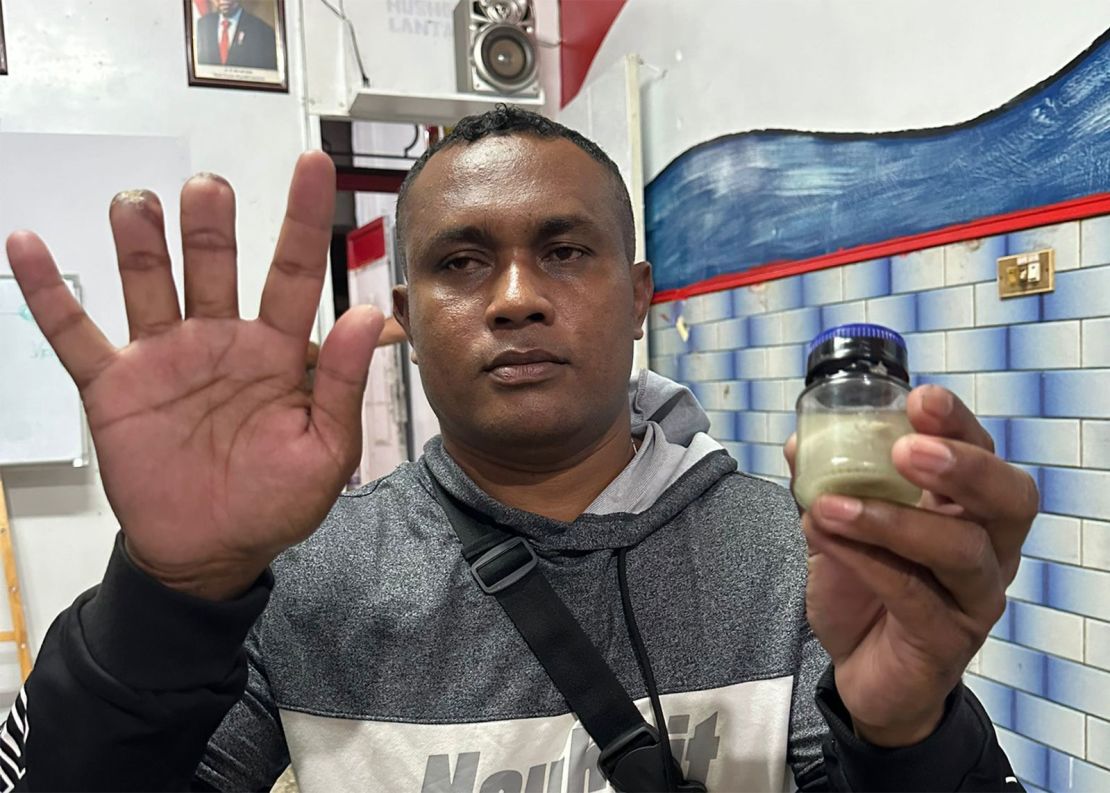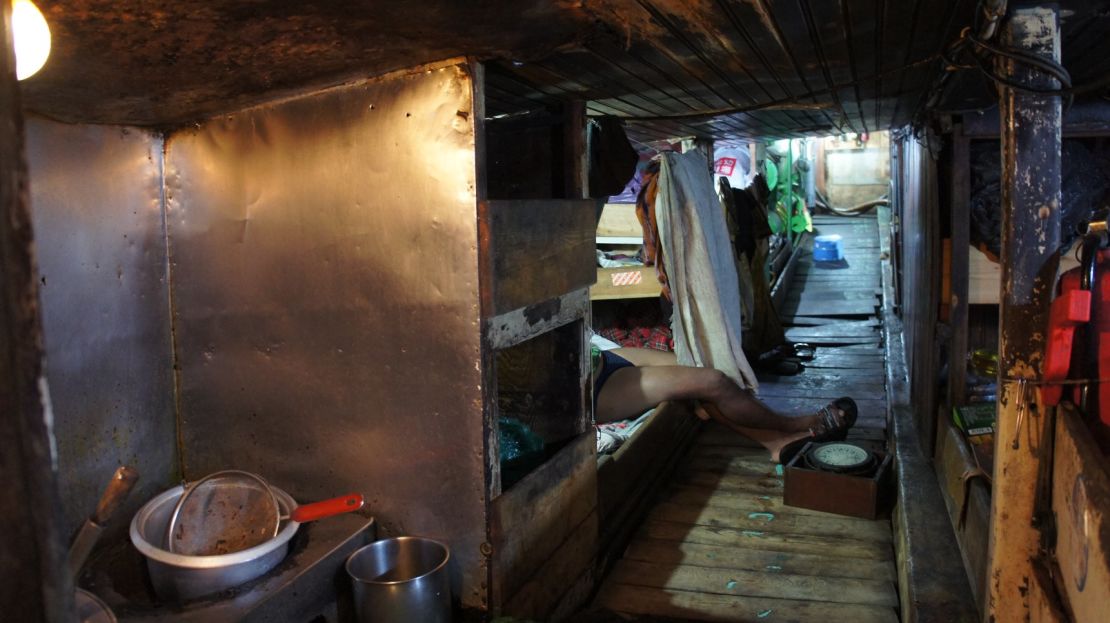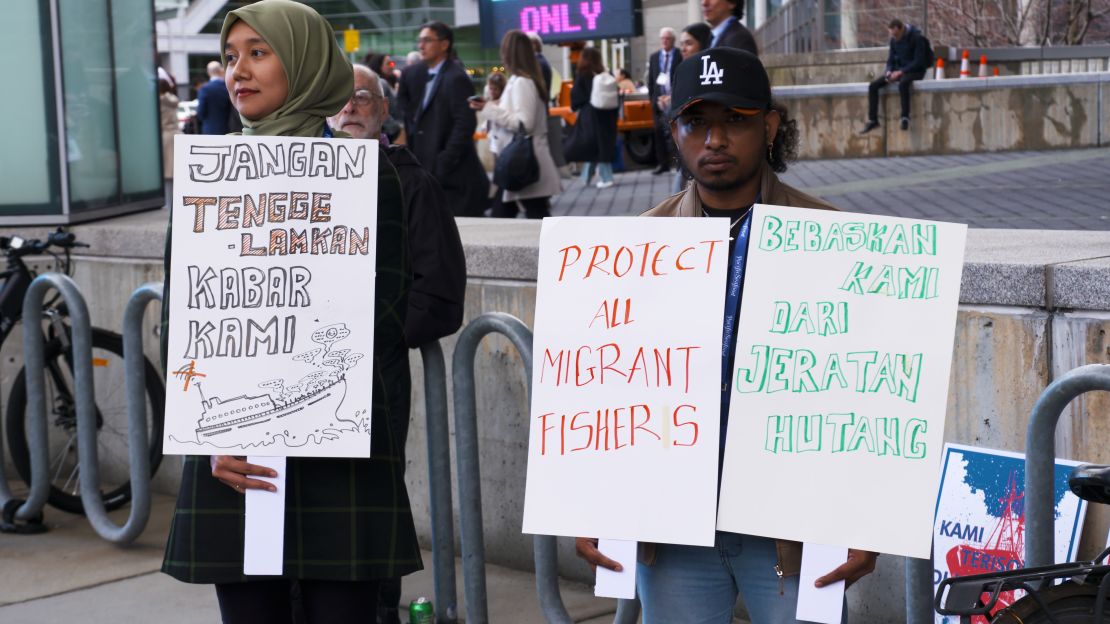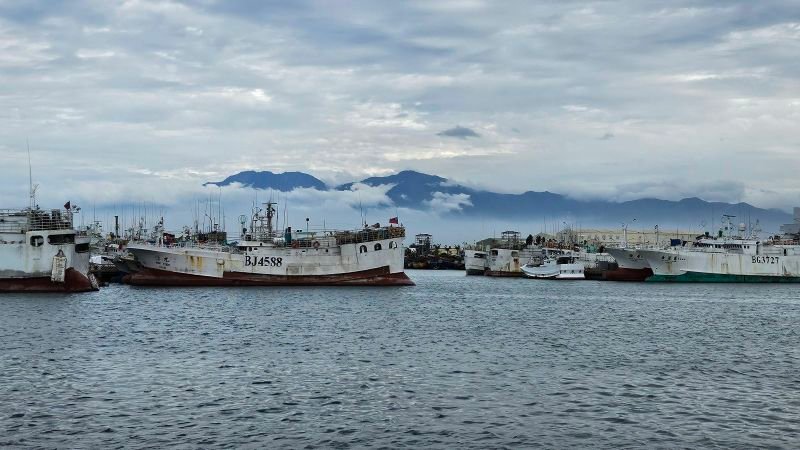Taipei, Taiwan
CNN
—
Silwanus Tangkotta was working aboard a Taiwanese fishing boat in the remote Pacific last year, when a heavy wave slammed a rolling metal door onto his hand, crushing his middle and ring fingers.
The Indonesian migrant fisherman needed medical attention, but the captain refused to return to port, saying they hadn’t caught enough fish to justify the trip. For over a month, Tangkotta endured the searing pain, forced to wrap the wound in tape and pick at exposed bone with a toothpick to prevent infection.
“I did whatever I could… I took nail clippers and toothpicks to destroy the protruding bones,” he told CNN. “I thought if I didn’t pull out the bone, the infection would continue and my fingers would rub.”
Tangkotta’s ordeal, while harrowing, is far from an isolated incident.
Taiwan operates the world’s second-largest distant-water fishing fleet — supplying tuna, squid and other seafood to supermarkets across the world, including the US and Europe.
The self-governing island is widely promoted as a beacon of liberalism and human rights in Asia, being a vibrant democracy with a relatively strong record on equality – for example, being one of only three Asian jurisdictions where same-sex marriage is legal.
But its treatment of migrant workers has come under growing international scrutiny, raising questions about its commitment to these values.
Since 2020, the US Department of Labor has listed Taiwan’s distant-water fishing industry as showing signs of forced labor, highlighting issues such as deceptive recruitment, withheld wages, physical violence and extreme working hours.
In a statement to CNN, Taiwan’s Fisheries Agency said the US Department of Labor’s reports were based on “unverified” information provided by NGOs, and described migrant fishermen as “important partners” in Taiwan’s fishing industry.
The agency said Taiwan was “one of the few” jurisdictions to “have implemented a concrete action plan on fisheries and human rights.”
Taiwan’s Ministry of Labor said it was working with the fisheries agency “to pragmatically safeguard the rights of distant-water migrant fishermen and to assist in enhancing relevant protection measures.”
Yet migrant workers like Tangkotta still face severe abuse, often without significant public attention, in part because they remain politically and socially marginalized.
Hailing from the Indonesian capital Jakarta, Tangkotta, now 38, began working on Taiwanese vessels in 2019, attracted by promises of better pay to support his family. In Indonesia, fishermen often earn less than $100 a month, an amount dwarfed by Taiwan’s minimum of $550.
But the reality was harsher than he expected. Aboard a medium-sized fishing vessel, Tangkotta spent up to four months at a time in the unforgiving Pacific, working 18-hour shifts with only brief rests in between. While the boat was designed for 23 crew members, only 16 were on board. Food was insufficient and often ran out quickly, he said.
But a bigger problem was extreme isolation. The boat had no internet, cutting the crew off from their families and preventing them from seeking help.
That isolation became critical when Tangkotta was seriously injured. The boat was near the Solomon Islands, about 5,000 kilometers (3,000 miles) from Taiwan, when the door crushed his fingers. With no way to call for help, he had no choice but to remain on board while the captain prioritized profits. When he was eventually transferred to another vessel weeks later, it too continued fishing rather than heading to port.
“I felt helpless, and the pain made it hard to sleep,” he said. “I was disappointed because the only thing on my mind was that I needed to go to land as quickly as possible.”

A month later, he was hospitalized in Taiwan with two lost fingers, but was immediately handed a termination letter – not because of the injury, the company said, but because his position had ended. As a result, he was denied compensation.
The Fisheries Agency said it received a report from the fishing vessel about Tangkotta’s case, and he received treatment from the captain throughout the trip.
“The case was reported to a shore-based doctor, who assessed that there was no immediate danger,” it said. “The captain continued to provide care for Mr. Tangkotta based on the doctor’s advice.”
CNN has reached out to Tangkotta’s previous employer and Indonesia’s representative office in Taipei for comment.
Taiwan’s distant-water fishing industry depends on more than 20,000 Indonesian and Filipino workers, but political will to protect their rights is lacking, said Allison Lee, co-founder of the Yilan Migrant Fishermen Union, which is based in a fishing port in northeastern Taiwan.
“Even though the US has labeled Taiwan’s fishing industry since 2020, the government responded with rhetoric but very little was changed,” she said, adding that many workers were promised decent salaries but faced overwork and delayed wages.
Unlike most migrant workers in Taiwan, distant-water fishermen operate under a different set of rules and are excluded from Taiwan’s Labor Standards Act, meaning they lack protections for overtime pay and health insurance that others are entitled to.
“There’s a very serious problem with overwork,” Lee added. “Some migrant workers were told there will be 10 crew members on board, but only four were on board and they had to work very long hours.”
Even basic safety measures were ignored, she said, with some told not to wear life jackets because they “got in the way” of their work.

In 2023, 10 Indonesian crew members aboard the You Fu vessel were owed 15 months of wages, while they were out at sea with no way to contact families or verify payments, according to Taiwan’s official Central News Agency. The fishermen were forced to eat bait with instant noodles due to food shortages, and faced routine verbal abuse, it reported, adding the salaries were eventually settled after the owner came under mounting pressure from media coverage.
Wage theft is one of the most widespread problems faced by migrant fishermen, said Achmad Mudzakir, a fisherman who serves as the leader of FOSPI, a Taiwan-based NGO that supports other crew members.
His organization regularly receives complaints about unpaid wages — with devastating consequences for families. “It is kind of painful because when we work hard at sea, we face high risks and we put our lives at stake. The late payments impact our families back home,” he said.
One solution, Mudzakir said, is requiring WiFi access for all migrant fishermen, because it would allow them to check their pay and seek help from NGOs, even from the middle of the ocean.
Regulations preventing migrant workers from switching jobs without returning to their home country or paying new agency fees should be scrapped, he added, because they discourage workers from reporting abuse for fear of dismissal and incurring debt.
In response to its inclusion on the US forced labor list, Taiwan’s Fisheries Agency said it has introduced reforms since 2022 – including raising minimum wages, installing CCTV on boats, and hiring new inspectors to improve working conditions. But activists like Lee criticized the measures as cosmetic, saying they were aimed at improving Taiwan’s image rather than addressing the root causes of forced labor.
Adrian Dogdodo Basar, a former Indonesian migrant fisherman, echoed calls for reform after seeing one of his closest friends die aboard a Taiwanese fishing vessel in 2023.
While working in the Pacific Ocean, his friend fell seriously ill with swollen legs and stomach pain. Adrian said the captain refused pleas to return to port, citing high costs, and offered only expired medicine. After several months – before the vessel returned – his friend died.
Adrian said he was punished with food deprivation and threats of salary deductions when he demanded the body be returned home immediately. “We asked him to just go to the nearest port to send the body home, but the captain denied us,” he said. “When I started protesting, I was not given any food.”
Like other migrant fishermen, Adrian paid more than US$2,000 in agency fees to secure the job – a debt that prevented other colleagues from speaking out, for fear of losing their work.

While these abuses may seem distant, Taiwan is the world’s seventh-largest seafood exporter, with its catch ending up on dining tables around the globe – meaning seafood on supermarket shelves may have been caught by exploited workers.
“American consumers are still at significant risk of consuming seafood tainted by modern slavery,” said Sari Heidenreich, Greenpeace USA’s senior human rights adviser. “It is essential for companies importing seafood from Taiwan to scrutinize their supply chains much more rigorously.”
Earlier this year, four Indonesian fishermen filed a landmark federal lawsuit against US canned-food giant Bumble Bee Foods, which is owned by Taiwanese seafood conglomerate FCF Co, alleging that the tuna giant “knowingly benefitted” from forced labor, debt bondage and other abuses in its supply chain. It is the first known case of fishing boat slavery brought against a US seafood company, Agnieszka Fryszman, one of the attorneys for the plaintiffs, told CNN.
As for Silwanus, who now relies on friends and relatives, he hopes no one else has to endure what he did.
“I hope that all my friends – all my brothers – who work aboard Taiwanese vessels receive proper treatment if they are injured at sea,” he said.
“I hope this only happens to me, and not again to other fishers.

